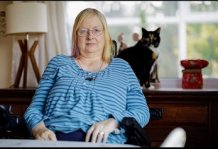Articles

Sharon Kilty, a wheelchair-user, responded to the survey to voice her concerns
Cornish charity exposes Governmental failure to support the most vulnerable
A rapid assessment of COVID-19 implications for disabled people in Cornwall has illustrated a failure by central government to support people who are the most vulnerable and adversely affected by the pandemic. It highlights how the government’s failure to act has devalued and pushed disabled people further to the margins and placed them at greater risk.
disAbility Cornwall & Isles of Scilly, a user-led disabled people’s organisation, acted on concerns for their stakeholders upon the COVID-19 Act suspending the Care Act, (which helps to improve people's independence and wellbeing), as well as hearing of the daily struggles many were facing with employing care staff, accessing information and PPE, obtaining fresh food, challenges to their ability to maintain wellness and more.
They released an online survey across county asking about COVID related self-isolation practices, access to PPE, employment of personal care assistants, life changes and key hopes and concerns for the near future, to which 83 people responded.
One respondent said: “Personally I have not been supported by charities in my local community, despite the fact of living alone. There are many like me, that’s fallen through the cracks, we are really socially isolated due to our complex health conditions, but even more so now”.
Sharon Kilty, a wheelchair-user who responded to the survey, said: “As usual I feel invisible when it comes to the government handling this situation. We are just not on the list! I don’t know what we have to do to be seen and treated as an equal part of society. We have to get on and manage things for ourselves as best we can.”
The Charity called on the assistance of partners in The Inclusivity Project, an ERDF-funded initiative led by the University of Exeter, to summarise the findings to ensure the voices of the most vulnerable is heard at national level. The results have since been submitted through a call for evidence by the Women & Equalities Parliamentary Committee in central government.
The report highlighted a number of pertinent and highly significant livelihood, social care and support needs that are not currently being met. Disabled people left with no access to family care, financial support or technological assistance are at particular risk alongside families dealing with multiple health conditions and livelihood changes.
Jane Johnson, Chief Executive of disAbility Cornwall said: “The lack of timely information and support, lack of COVID testing for care staff, and poor provision of inclusive information has caused considerable fear and confusion for many. Some people’s stories are truly heart-breaking, more can and should be done now to alleviate further suffering. The most vulnerable people at this time can see no end to the current crisis for them. When we hear things like ‘thoughts of self-harming due to isolation from family, anxiety and basic livelihood needs not being met’, we must act.”
Esmaeil Khedmati-Morasae, University of Exeter researcher from The Inclusivity Project, who summarised the survey said: “A few months ago, The Inclusivity Project was aiming to help close the employment gap from the employer side. The assumption was that, if we could identify the policies that would positively influence the employment system (for example - more remote working, or ironing out unintended discrimination in recruitment processes) that equality wasn’t far off. This survey shows a worrying backward trend as disabled people, and people with long-term illness, become even more isolated and unseen, and their increased vulnerability to coronavirus makes them even more off the radar for their community, let alone employers. They are being devalued further in terms of their participation and contribution to society.”
The recommendations in the report call for immediate action on the following to improve the situation:
· Ensuring a more comprehensive Government approach to identifying and notifying (in writing) disabled people and carers with overlooked shielding needs;
· Communicating these needs to supermarket and other food providers, along with pharmacies, to ensure timely and regular access to food and medicine deliveries;
· Introducing flexibility in the spending of Direct Payments to ensure care and livelihood needs can be met in these unprecedented times;
· Providing necessary PPE and COVID-19 testing for all key workers (including personal care assistants and formal/informal care workers);
· Ensuring key workers with existing health conditions or new household care responsibilities are supported by employers to self-isolate without detrimental financial repercussions;
· Mainstreaming more inclusive forms of information provision and communication that do not presume universal access to Information Technology (IT);
· Providing access to online/phone counselling and health support for self-isolating individuals with specific health needs and family members with increased care responsibilities;
· Collaborating with the disability community to produce and share a clear plan for how the needs and priorities of disabled people will be respected and met as lockdown restrictions are eased;
· Ensuring the changes introduced by the Covid-19 Act to social care needs assessment and provision processes are reversed as soon as possible and do not continue to infringe upon the human rights and wellbeing needs of disabled people.
· Considering the many interdependencies between health and social care systems, and the many uncertainties and emergent outcomes of the COVID-19 pandemic, adopting a complex system approach to policy that joins up many laudable interventions and responses across these sectors could be a valuable way forward.
Date: 13 May 2020
